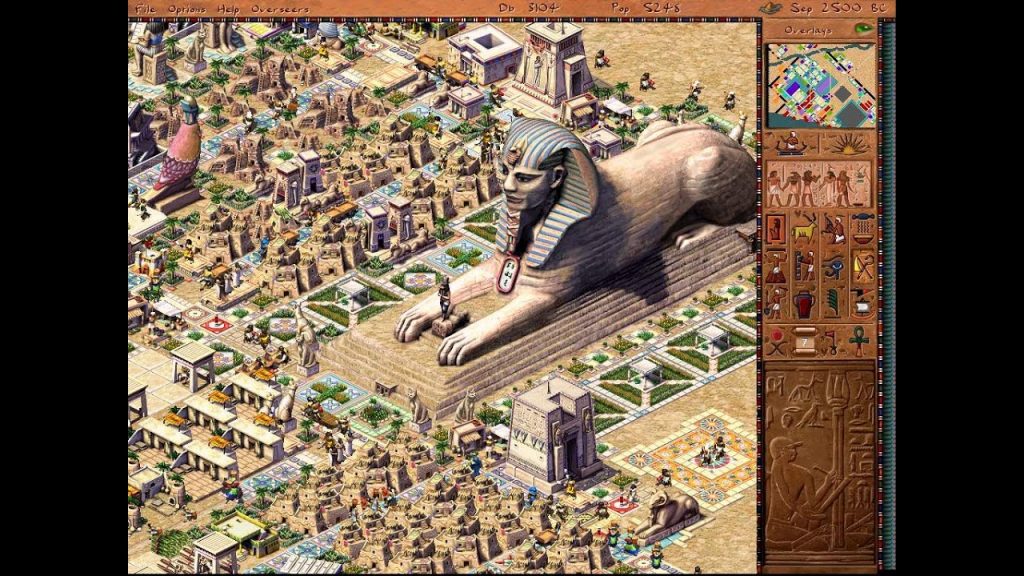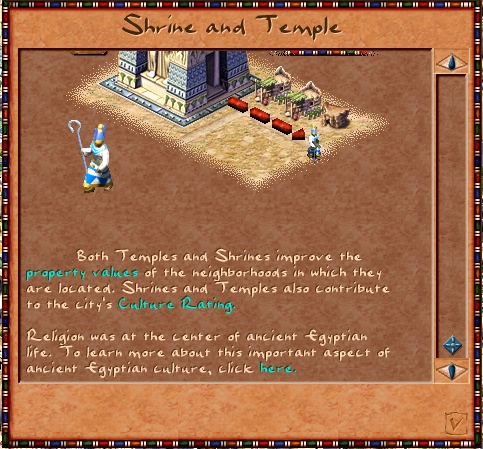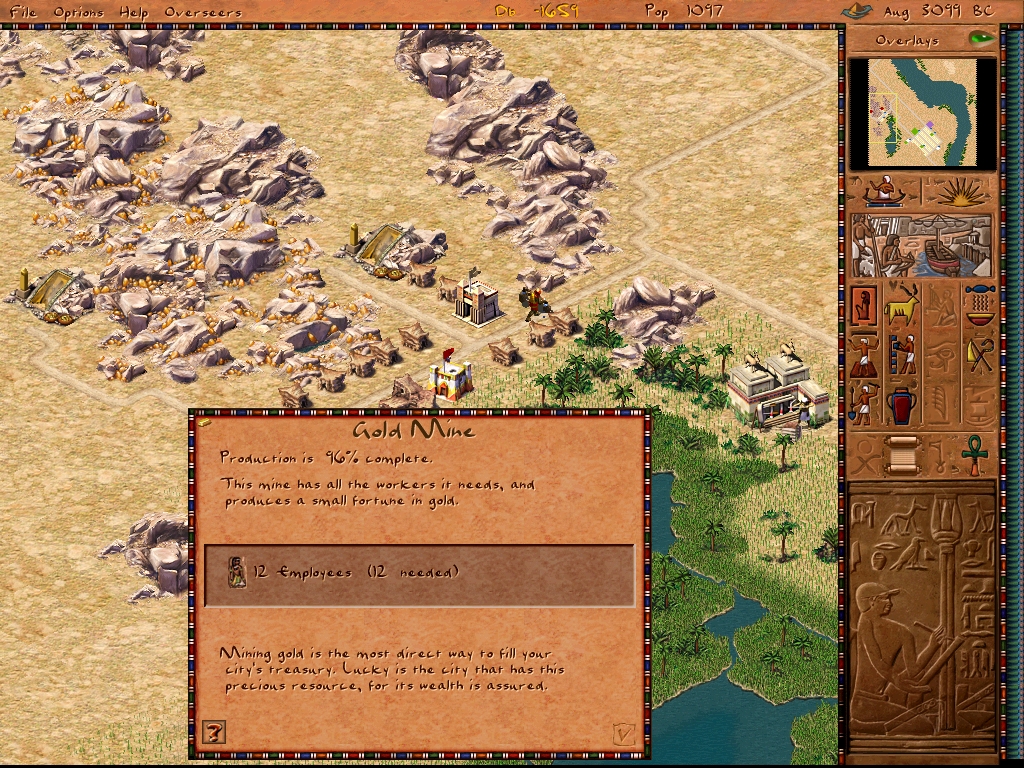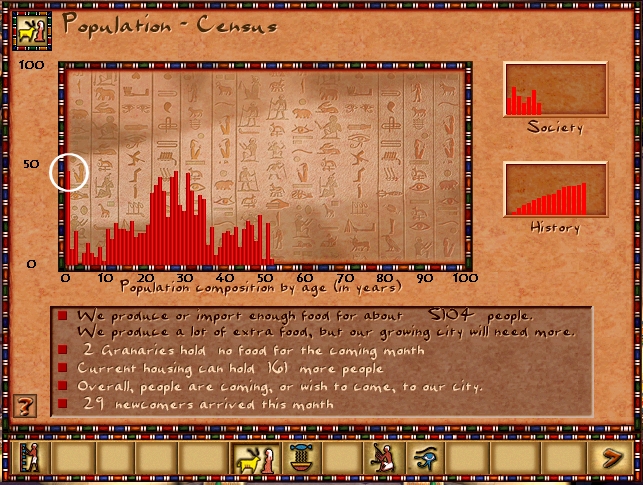Developer Dotume has announced that a complete remake of the ever-popular city-builder Pharaoh (1999) is set to be released in 2021. Pharaoh: A New Era promises to once again challenge us with missions, bring us in contact with the ancient Egyptian civilization, and built an amazing empire.
The game Pharaoh came out over twenty years ago in 1999 and became an instant classic. This city-building game takes place in Ancient Egypt and the player leads ‘a great family’ that should steadily rise to power throughout fifteen centuries and two dozen generations, by managing cities and people’s needs. To this day Pharaoh is still being mentioned as the best city-builder game ever (one of the public’s favourite on sites as ‘ranker’ ‘the gamer’ and at least in a top 10 on other sites) and you only have to look at the Steam reviews to realise this game holds a special place in many hearts.
Reason enough to give this game a new life in the upcoming game Pharaoh: A New Era that is expected to be released in 2021. Since this is still quite some months in the future, this is the perfect opportunity to revisit the original and wonder; how did a game of 20 years old remain popular? Is it due to a major feeling of gamer-nostalgia or is there more to it? What do we hope changes or remain the same in A New Era?
“Pharaoh’s blend of addictive gameplay and excellent mission design kept me at my computer straight through many nights.”
— Trent C Ward, 13 nov 1999
Revisiting the classic
Pharaoh welcomes you with the promise ‘Build a kingdom. Rule the Nile. Live forever.’, which helps you get in the mindset for this game. It has five different era’s one can play successively; predynastic period, archaic period, old kingdom, middle kingdom and the new kingdom. First things first, when starting Pharaoh it is obviously a game from a long time ago. The graphics are simply outdated. A New Era promises to update this and the first art we see seems promising (using Ultra HD Graphics). While the gameplay still works fine (sometimes a few settings need to be altered) on Pharaoh, for the remake they promise a complete upgrade of gameplay mechanics (hopefully moving the camera with WASD keys). Secondly, they will completely redesign the soundtrack.

The player completes missions to advance to a new step or era and every time new elements are introduced into the game, raising the difficulty. Now, for a city-building game, this works marvellously. Players can slowly adapt to new challenges and are not overwhelmed by too many things at once. From a historic perspective, this could be viewed as problematic; in this way, historical processes are represented to be linear; players could get the idea that civilisations always need to complete one step before they take next. Sometimes this is defendable; yes food is probably more important than musical recitals for survival. On other occasions less so; having specific gods added at certain points might not have been accurate, they could occur from a similar point onward. Another example is having beer breweries added after apothecaries arise; in some cities, this might have been the case, but it is certainly not a standard order (if you want to delve deeper in this, click here).
Pharaoh is stuffed with small details that make the game even more immersive. The game routinely encourages players to read more about Ancient Egyptian civilization by providing all kinds of information, for example, trends in granary architecture in different periods of Ancient Egyptian history. Another neat detail is that you can click on any house or person to see how they are doing and what the individual is ‘thinking’. This way the game can spark interest for the civilization in players. However, one should bear in mind that this game does not claim to be educational, it places itself into the realm of historical fiction. Small jokes as the ‘policemen’ dressed in modern-day blue, but still in Ancient Egyptian shenti, are then easily forgiven. I will now turn my attention to some key elements of the game.
“Pharaoh will take over your life, and then leave you foaming at the mouth and pulling your hair out in frustration whenever something goes wrong”
— Gestalt, 4 juli 2006
Religion
This game really drives home the fact of how important religion was in this time. This ‘need’ is introduced fairly early, from the predynastic period onward and features Bast (Bastet), Osiris, Ra, Ptah and Seth. The player can, or well, has to, construct shrines, temples and temple complexes to appease the gods. Why has to? If you manage to anger a god they will make sure disasters happen to your city, if you achieve to get on their good side they will bestow gifts. This goes to show just how active the role of the gods was in the everyday life of a person and city. The player is forced to think of the needs of the gods as a pretty high priority. Festivals are also an important way to honour the gods. When this need is disregarded for too long ‘people will start to feel hopeless’. Indeed, in antiquity festivals made out an important part of peoples social life, with usually several festivals held each year.

Without the gods on your side, this game becomes a lot harder!Industry
The further you get in this game, the more options you have you manufacture goods. The first ‘industrial building’ the player gets is the goldmine, where precious gold is extracted from the earth and you need a palace where your workers can bring the gold (just make sure they won’t get robbed!). Indeed, in antiquity, Egypt was known for its immense wealth and goldmines can actually be traced back to the predynastic period, not so strange then to let one start with this building. After the gold, you place a clay pit and a potter, virtually essential to many civilizations, after that more buildings and more goods. This shows the great variety of goods that citizens were able to produce and obtain.

The Nile
When someone thinks of Ancient Egypt, one should think of the Nile. This river played an absolutely vital role for the people living in the surrounding lands. To be able to have any viable form of agriculture, flooding of the Nile is needed so that the barren ground is covered with a fertile layer. In Pharaoh this is no different, the player has to cope with years of better and lesser inundation of the river, which influences food production. Multiple years a bad inundation can cause a great famine under your people.
Overviews
Pharaoh is an easy game to get into, but is difficult to master, specific events and new problems keep the player on their toes. This is part of the reason this game was and is regarded as so addictive. Everything seems to be going right in your city, until a mistake is made and it all comes crumbling down. An important part of mastering Pharaoh is the overview tab and this also shows just how detailed this game can be. In this menu, you are welcomed with an abundance of information; census, living conditions, your current stance with the gods, granary status, how well covered your city is with regard to doctors, apothecary’s, entertainment, and much, much more.
If you pay close attention to the signs, you can prevent problems from arising in the first place. A nice historically ‘accurate’ touch; at the beginning of building your city you can see that people arriving are from practically all ages, but the 20-40 age bracket has a slight majority. After a few years, you will see the ages 0-4 spike, showing that your original immigrants are starting families as they settled down, creating averagely a younger population (unless you keep immigrant coming steadily)

Concluding
Of course, I could have chosen many other elements to showcase here. These are just some of the key features of this massively popular game. After playing it for a while, can it still hold the attention of a gamer used to modern games? Definitely! You will want your family to succeed and to make the best city possible, and you just might learn some new facts along the way. A New Era will be packed with over 100 hours of gameplay, 53 missions to complete and adds a full map and mission editor, absent from Pharaoh, so it really gives us something to look forward to.
“I love a good city builder, and Pharaoh is my favorite. I’ve been playing this game for 20 years and I’m still not sick of it.”
— Steam, ‘Marius’ 8 juli 2020
